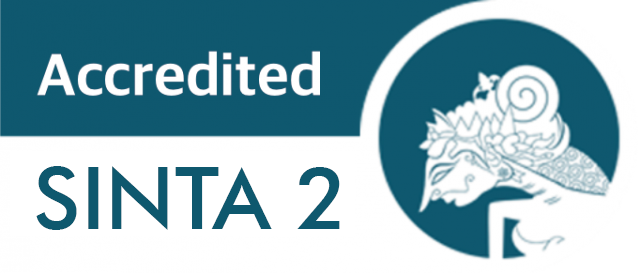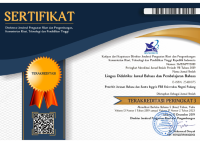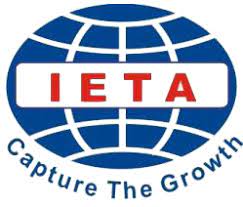Exploring the Needs of Lecturers for Blended Project-Based Learning in Argumentative Writing
 ), Refnaldi Refnaldi(3), Fauzul Aufa(4),
), Refnaldi Refnaldi(3), Fauzul Aufa(4), (1) Uneversitas Negeri padang; UIN Mahmud Yunus Batusangkar
(2) Universitas Negeri Padang
(3) Universitas Negeri Padang
(4) Monash University
 Corresponding Author
Corresponding Author
Copyright (c) 2024 Lingua Didaktika: Jurnal Bahasa dan Pembelajaran Bahasa
DOI : https://doi.org/10.24036/ld.v18i2.131095
Full Text:
 Language : en
Language : en
Abstract
The Blended Project-Based Learning (BPjBL) model plays a crucial role in enhancing argumentative writing skills. To implement this model, it is essential to conduct a needs analysis with lecturers. It helps identify their specific requirements and preferences in developing and applying the model.The study aimed to explore lecturers' need for the necessity aspect of the BPjBL model in teaching argumentative writing. The design of the research was quantitative by using a survey. The respondents of the research were 15 lecturers from various universities in Indonesia. They have been chosen using a purposive sampling technique. The criteria were the lecturers who had taught argumentative writing at the university. The data was collected through a questionnaire. The questionnaire was validated by two experts, and the result was very valid. The reliability of the questionnaire was excellent, with a mean score of 0.964. The study was analyzed by using descriptive analysis statistics using SPSS 38. From this study, it was found that the lecturer highly needed the aspects of argumentative writing reason, argumentative writing topic, argumentative writing skill, language ability, language structure, language use, argumentative writing context, and teaching model with a mean score of 3.33. The findings showed that lecturers are highly needed for the argumentative writing aspect and teaching models such as blended learning and project-based learning.
Keywords
References
Alamri, M. M. (2021). Using blended project-based learning for students’ behavioral intention to use and academic achievement in higher education. Education Sciences, 11(5). https://doi.org/10.3390/educsci11050207
Asmawi, A., Dong, H., Zhang, X., & Sun, L. (2024). Exploring the transformative power of blended learning for Business English majors in China (2012–2022) – A bibliometric voyage. Heliyon, 10(2), e24276. https://doi.org/10.1016/j.heliyon.2024.e24276
Asser, H., & Poom-Valickis, K. (2002). Learning to write: from choosing the topic to final draft. The European Reading Conference, 1, 12. https://eric.ed.gov/?id=ED417056
Basturkmen, H. (2009). Learning for Academic Purposes. 129–136.
Basturkmen, H. (2018). Needs Analysis and Syllabus Design for Language for Specific Purposes. The Encyclopedia of Applied Linguistics, 1–8. https://doi.org/10.1002/9781405198431.wbeal0861.pub2
Bryan, A., & Volchenkova, K. N. (2016). Blended Learning: Definition, Models, Implications for Higher Education. Bulletin of the South Ural State University Series “Education. Education Sciences,” 8(2), 24–30. https://doi.org/10.14529/ped160204
Cahyadewi, A. (2021). The Analysis of University Students’ Critical Thinking in the Writing Argumentative Essay in the English Department of UNESA. Jurnal Pendidikan Indonesia (Japendi) Vol. 2 No. 9 September 2021 p-ISSN : 2745-7141 e-ISSN : 2746-1920 Pendidikan, 2(9), 6.
Fahlevi, M. R. (2022). Kajian Project Based Blended Learning Sebagai Model Pembelajaran Pasca Pandemi dan Bentuk Implementasi Kurikulum Merdeka. Sustainable Jurnal Kajian Mutu Pendidikan, 5(2), 230–249. https://doi.org/10.32923/kjmp.v5i2.2714
Ferretti, R. P., & Graham, S. (2019a). 1. Ferretti RP, Graham S. Argumentative writing: theory, assessment, and instruction. Read Writ [Internet]. 2019;32(6):1345–57. Available from: https://doi.org/10.1007/s11145-019-09950-xArgumentative writing: theory, assessment, and instruction. Reading and Writing, 32(6), 1345–1357. https://doi.org/10.1007/s11145-019-09950-x
Ferretti, R. P., & Graham, S. (2019b). Argumentative writing: theory, assessment, and instruction. Reading and Writing, 32(6), 1345–1357. https://doi.org/10.1007/s11145-019-09950-x
Graham, S., & Perin, D. (2007). A Meta-Analysis of Writing Instruction for Adolescent Students. Journal of Educational Psychology, 99(3), 445–476. https://doi.org/10.1037/0022-0663.99.3.445
HARTIA, H. N. (2022). the Implementation of Combining Blended Learning and Project Based Learning in Teaching Efl Critical Reading To Students of …. SELL (Scope of English Language Teaching …, 7(2), 154–167. http://194.59.165.171/index.php/SL/article/view/825
Hutchinson, T., & Waters, A. (1987). English for Specific Purposes A learning-centered approach. Cambridge University Press.
Ilham, I. (2023). Need Analysis for Developing Paragraph Writing Materials Based on Problem-Based Learning Model for Indonesian Efl Learners. English Review: Journal of English Education, 11(3), 833–842. https://doi.org/10.25134/erjee.v11i3.8326
Johan, A. (2024). Analysis of Critical Thinking Skills Through Argumentative Essay Writing. English Journal Literacy Utama, 8(1), 36–45. https://doi.org/10.33197/ejlutama.v8i1.232
Luna, M., Villalón, R., Mateos, M., & Martín, E. (2020). Improving university argumentative writing through online training. Journal of Writing Research, 12(1), 233–262. https://doi.org/10.17239/JOWR-2020.12.01.08
Lyu, E. (2022). Lindy Woodrow, Introducing Course Design in English for Specific Purposes. ASp, 82, 145–153. https://doi.org/10.4000/asp.8222
Maharani, A. A. P., Padmadewi, N. N., Ratminingsih, N. M., & Santosa, M. H. (2023). The Milestone of Blended Process-Based Approach in Argumentative Writing: Exploring the Sophomore’s Perception and Writing Achievement. Journal of Language Teaching and Research, 14(2), 327–339. https://doi.org/10.17507/jltr.1402.08
Mergendoller, J. R., & Thomas, J. W. (2000). Managing project based learning: Principles from the field. Annual Meeting of the American Educational Research Association, 1–51. http://www.bie.org/images/uploads/general/f6d0b4a5d9e37c0e0317acb7942d27b0.pdf
Nejmaoui, N. (2018). Improving EFL Learners’ Critical Thinking Skills in Argumentative Writing. English Language Teaching, 12(1), 98. https://doi.org/10.5539/elt.v12n1p98
Newbury, R. (2013). Are Design Elements in Blended Learning Courses Factors of Student Completion Rate? International Journal of Technology in Teaching & Learning, 9(2), 139–158. http://0-search.ebscohost.com.library.vu.edu.au/login.aspx?direct=true&db=ehh&AN=99401102&site=ehost-live
Nimehchisalem, V., & Mukundan, J. (2011). Determining the Evaluative Criteria of an Argumentative Writing Scale. English Language Teaching, 4(1), 58. https://doi.org/10.5539/elt.v4n1p58
Nussbaum_Schraw_2007. (n.d.).
Oktarina, S., Indrawati, S., & Slamet, A. (2023). Needs Analysis for Blended Learning Models and Project-Based Learning to Increase Student Creativity and Productivity in Writing Scientific Papers. AL-ISHLAH: Jurnal Pendidikan, 15(4), 4537–4545. https://doi.org/10.35445/alishlah.v15i4.3187
Padmadewi, N. N., Artini, L. P., Ratminingsih, N. M., Suhardiana, I. P. A., Zamzam, A., & Juniarta, P. A. K. (2023). Designing Project-Based Learning in Research Proposal Writing: Its Effect, Problems, and Scaffolding Utilized. Studies in English Language and Education, 10(2), 841–862. https://doi.org/10.24815/siele.v10i2.27408
Pantiwati, Y., Kusniarti, T., Permana, F. H., Nurrohman, E., & Sari, T. N. I. (2023). The Effects of The Blended Project-Based Literacy that Integrates School Literacy Movement Strengthening Character Education Learning Model on Metacognitive Skills, Critical Thinking, and Opinion Expression. European Journal of Educational Research, 12(1), 145–158. https://doi.org/10.12973/eu-jer.12.1.145
Parnawati, T., & Ulinuha, A. (2019). Journal of English Education and Applied Linguistics. Journal of English Education and Applied Linguistics, 8(2), 214–225. https://fkip.ummetro.ac.id/journal/index.php/english%0ALL
Patton, A. (2018). Work that Matters: The Teacher’s Guide to Project-Based Learning. In Creative Education (Vol. 1, Issue 1). http://www.bie.org/research/study/review_of_project_based_learning_2000%0Ahttp://www.ijese.com%0Ahttp://bie.org/x9JN%0Ahttps://www.intel.com/content/dam/www/program/education/us/en/documents/project-design/projectdesign/benefits-of-projectbased-learning.p
Pesce M.S et all. (2016). Argumentative Writing Through A 21st Century Framework: An Action Research Study. 4(June), 2016. https://doi.org/Unpublish Disertation
Prafitasari, F., Sukarno, S., & Muzzazinah, M. (2021). Integration of Critical Thinking Skills in Science Learning Using Blended Learning System. International Journal of Elementary Education, 5(2), 434. https://doi.org/10.23887/ijee.v5i3.35788
Rahmawati, F., Sarwanto, S., & Budiawanti, S. (2021). Needs analysis of physics e-module based on hybrid-PBL model on critical thinking skills improvement. Momentum: Physics Education Journal, 5(2), 175–181. https://doi.org/10.21067/mpej.v5i2.5740
Rochmahwati, P., Yuliasri, I., Sukarno, & Pratama, H. (2024a). Unleashing analytical mastery: elevating HOTS with hybrid project-based learning in academic writing courses. International Journal of Evaluation and Research in Education, 13(5), 3571–3578. https://doi.org/10.11591/ijere.v13i5.29595
Rochmahwati, P., Yuliasri, I., Sukarno, S., & Pratama, H. (2024b). Shared voices from the classroom: Reflections on hybrid project-based learning in an academic writing course. Journal of Education and Learning, 18(2), 305–312. https://doi.org/10.11591/edulearn.v18i2.21150
Salma, W. A. (2020). I ndonesian J ournal of I nformatics E ducation The Effectiveness and effect of Project-Based Blended Learning on Student Achievement in Online Learning. Indonesian Journal of Informatics Education, 4(1), 1–8.
Saputra, A. B. B., Jumariati, & Febriyanti, E. R. (2021). EFL Students’ Problems in Writing Argumentative Essays. Proceedings of the 2nd International Conference on Education, Language, Literature, and Arts (ICELLA 2021), 587(Icella), 8–12. https://doi.org/10.2991/assehr.k.211021.002
Setyowati, L., Agustina, F., Sukmawan, S., El-Sulukiyyah, A. A., & Mabaroh, B. (2020). The Students’ Problems and Solutions in Writing an Argumentative Essay on Gender Issue. Journal of English Language Teaching and Linguistics, 5(3), 279. https://doi.org/10.21462/jeltl.v5i3.424
Syaripuddin, R., Barat, U. S., & Nur, R. A. (2023). Need Analysis to Develop English Writing Materials for ESP Instruction Need Analysis to Develop English Writing Materials for ESP Instruction. July. https://doi.org/10.31327/jee.v8i1.1901
Taufiq, M., Wijayanti, A., & Yanitama, A. (2020). Implementation of blended project-based learning model on astronomy learning to increase critical thinking skills. Journal of Physics: Conference Series, 1567(4), 13–17. https://doi.org/10.1088/1742-6596/1567/4/042049
Telaumbanua, S. (2022). The Effect of Project Based Blended Learning Towards Negotiation Text Writing Ability Moderated by Learning Motivation. AL-ISHLAH: Jurnal Pendidikan, 14(2), 2327–2334. https://doi.org/10.35445/alishlah.v14i2.1159
Tong, D. H., Uyen, B. P., & Ngan, L. K. (2022). The effectiveness of blended learning on students’ academic achievement, self-study skills and learning attitudes: A quasi-experiment study in teaching the conventions for coordinates in the plane. Heliyon, 8(12), e12657. https://doi.org/10.1016/j.heliyon.2022.e12657
Ummah, S. K., Inam, A., & Azmi, R. D. (2019). Creating manipulatives: Improving students’ creativity through project-based learning. Journal on Mathematics Education, 10(1), 93–102. https://doi.org/10.22342/jme.10.1.5093.93-102
Wambsganss, T., Janson, A., & Leimeister, J. M. (2022). Enhancing argumentative writing with automated feedback and social comparison nudging. Computers and Education, 191(August), 104644. https://doi.org/10.1016/j.compedu.2022.104644
Weinberger, A., Stegmann, K., Fischer, F., & Mandl, H. (2007). Scripting Argumentative Knowledge Construction in Computer-Supported Learning Environments. Scripting Computer-Supported Collaborative Learning, 191–211. https://doi.org/10.1007/978-0-387-36949-5_12
Yang, R. (2022). An empirical study on the scaffolding Chinese university students’ English argumentative writing based on toulmin model. Heliyon, 8(12), e12199. https://doi.org/10.1016/j.heliyon.2022.e12199
Yundayani, A., Emzir, E., & Rafli, Z. (2017). Need Analysis: the Writing Skill Instructional Material Context for Academic Purposes. English Review: Journal of English Education, 6(1), 59. https://doi.org/10.25134/erjee.v6i1.771
Yustina, Syafii, W., & Vebrianto, R. (2020). The effects of blended learning and project-based learning on pre-service biology teachers’ creative thinking skills through online learning in the COVID-19 pandemic. Jurnal Pendidikan IPA Indonesia, 9(3), 408–420. https://doi.org/10.15294/jpii.v9i3.24706
Zhang Keke. (2019). Developing a Rating Scale for Classroom Assessment of the Argumentative Writing of Chinese EFL College Students Majoring in English Thesis submitted for the degree of Doctor of Philosophy at the University of Leicester by Keke Zhang.
 Article Metrics
Article Metrics
 Abstract Views : 37 times
Abstract Views : 37 times
 PDF Downloaded : 17 times
PDF Downloaded : 17 times
Refbacks
- There are currently no refbacks.
Copyright (c) 2024 Lingua Didaktika: Jurnal Bahasa dan Pembelajaran Bahasa

This work is licensed under a Creative Commons Attribution-NonCommercial 4.0 International License.









